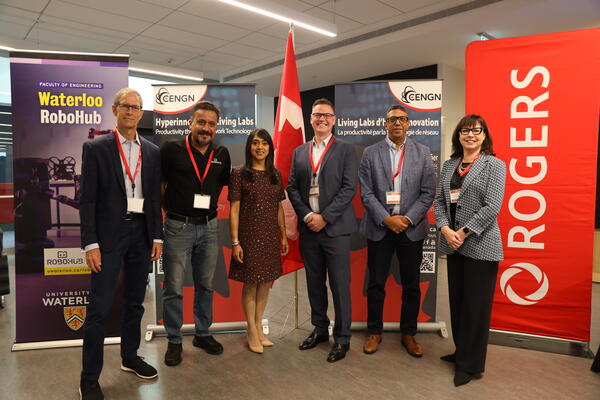
Waterloo researcher invents rechargeable battery for a greener future
New zinc-air rechargeable battery is cheaper, safer and better for the environment thanks to nanotechnology

New zinc-air rechargeable battery is cheaper, safer and better for the environment thanks to nanotechnology
By Dave Pink Communications and Public Affairs
An innovative rechargeable battery invented by a Waterloo nanotechnology researcher could create a greener future by storing power from a smart grid or driving the next generation of electric cars.
Zhongwei Chen, an associate professor of chemical engineering, says the zinc-air rechargeable battery, which could be on the market within a year, may one day be used to store energy generated by solar collectors and wind turbines.
The battery was made possible with a unique nanomaterial that acts as a catalyst to drive energy, says Chen, who is also a member of the Waterloo Institute for Nanotechnology.
The use of zinc in batteries is nothing new, says Chen. It’s been used for many years in the one-time-use batteries in hearing aids. The challenge, he says, was making a zinc battery rechargeable.
Rechargeable batteries must be able to perform two functions. First, they give off energy and then the process is reversed so that they accept energy. To make that happen, Chen had to come up with the right chemical soup to act as a catalyst. He did: nitrogen-doped carbon nanotube. “It’s a unique catalyst that we developed,” says Chen.
Zinc is affordable and better for the environment
“The critical challenge has been the energy storage system, to make it more practical,” says Chen, “The advantage to zinc is its low cost, its higher energy density, safety and it’s environmentally friendly.”
That gives zinc a big edge over lithium-ion batteries, which are costly, bulky and prone to bursting into flames. Chen says the zinc battery has three to five times the energy density of lithium batteries and, because zinc is plentiful and lithium is not, they can be manufactured for one-sixteenth of the price.
The affordable zinc-air battery is the obvious solution for the storage of power from wind turbines and solar collectors, says Chen. As well, because of their smaller size and cheaper cost, they will fit nicely into the next generation of electric cars. Chen and his student team have already tested the zinc-air battery, with great success, in an electric scooter.
The batteries being tested in Chen’s lab have been recharged up to 3,000 times, which means it could keep an electric car on the road for about 10 years.
Meanwhile, Saeed Syrus Bagheri, the university’s technology transfer officer, is clearing the way to get the battery out into the market. Several U.S. patents have been secured, and the federal and provincial governments have chipped in some grant money to move the process along. Potential investors are being approached, and when a company is formed the university will have a seat on the board.
Meanwhile, says Bagheri, the battery is attracting plenty of international interest and for the past two years it’s been featured at the prestigious TechConnect World Summit in the U.S.
Chen did his PhD at the University of California, Riverside. He came to Waterloo after a short stay at the Los Alamos National Laboratory in New Mexico.

Read more
New medical device removes the guesswork from concussion screening in contact sports using only saliva

Read more
Here are the people and events behind some of this year’s most compelling Waterloo stories

Read more
Living Lab initiative will help Canadian companies test and validate products and services at Waterloo’s RoboHub
The University of Waterloo acknowledges that much of our work takes place on the traditional territory of the Neutral, Anishinaabeg, and Haudenosaunee peoples. Our main campus is situated on the Haldimand Tract, the land granted to the Six Nations that includes six miles on each side of the Grand River. Our active work toward reconciliation takes place across our campuses through research, learning, teaching, and community building, and is co-ordinated within the Office of Indigenous Relations.